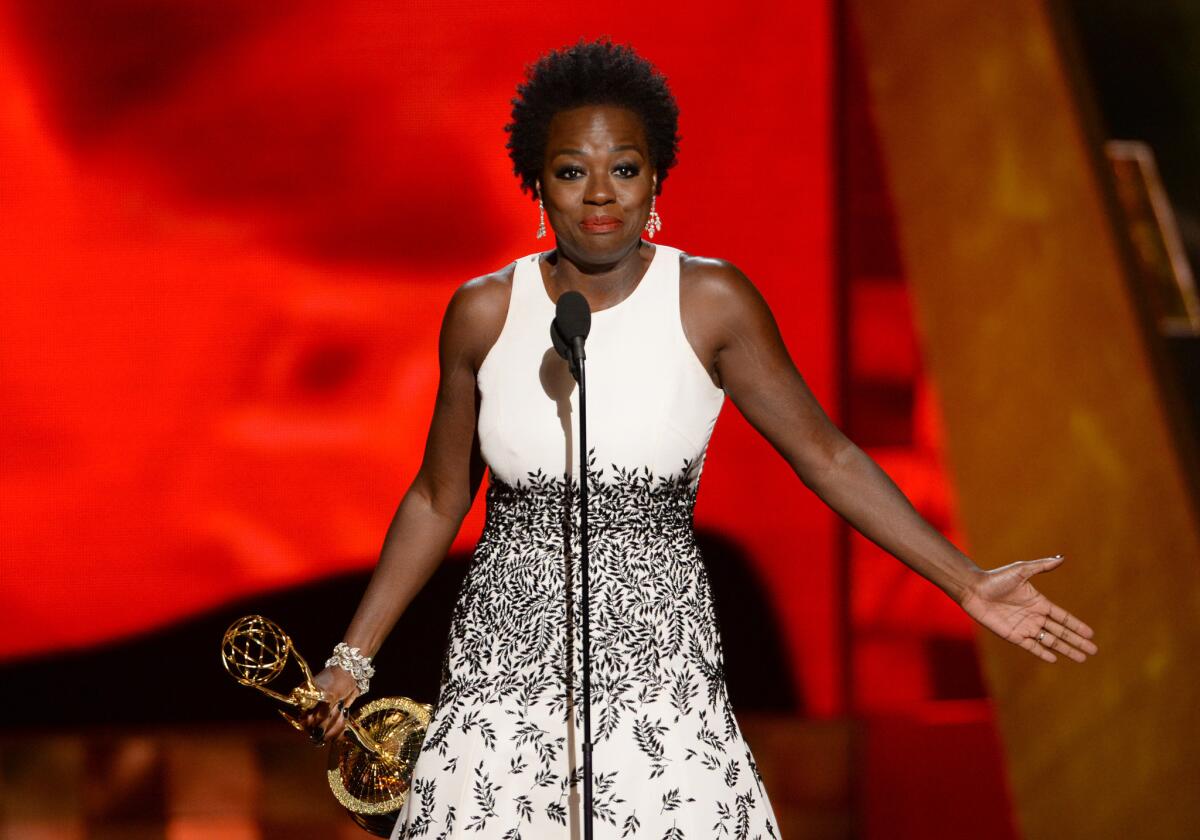Commentary: Viola Davis and the ‘white feminist’ backlash

Viola Davis’ speech at the Emmy Awards after she won lead actress in a drama series drew criticism from a white actress -- and then counter-criticism and more.
- Share via
By most accounts, Viola Davis’ speech at the Emmys was an instant classic. She directly addressed the lack of diversity on television, saying, “The only thing that separates women of color from anyone else is opportunity.”
But Davis’ words about race made one actress feel uncomfortable.
Sunday night, “General Hospital” actress Nancy Lee Grahn, who is white, took to Twitter and said that the Emmys were not a “venue [for] racial opportunity” and that Viola Davis “has never been discriminated against.”
FULL COVERAGE: Emmys 2015
Social media was quick to criticize her, and by Sunday evening she was a trending topic on Twitter. Grahn quickly apologized and then fired off a series of tweets that sought to explain her thinking.
“I never expected every black Twitterer to attack … and after being on my knees have no [forgiveness],” she wrote in her series of tweets. She also said that she felt “betrayed” by people she “would’ve marched for.”
This was widely criticized as being patronizing, as if her commitment to social justice was predicated on black people being nice to her. Grahn attempted to clarify her stance by saying that she wanted “equality [for] ALL women.” This too was not well received.
PHOTOS: Emmys 2015 Top nominees and winners | Red carpet | Show highlights
To some observers, Grahn’s rolling Twitter screed was an example of “white feminism.”
According to Cate Young, author of feminist pop culture blog BattyMamzelle, “white feminism” is feminism that is aware of sexism but fails to “consider race as a factor in the struggle for equality.”
In an interview with The Times, Young said that the phrase is often misunderstood as an attack on white women.
But as Young and others have explained it, “white feminism” is not necessarily feminism by white people. Instead, it is feminism for whites — that is, it benefits only whites. The term is a way to caution feminists who might ignore the lives and experiences of women of color.
The immediate defensiveness of many white women when race is brought up, Young said, is not unique to Grahn. “Women do have common struggles,” she said, “but for women of color, we also have to deal with racism as well.” The trouble is that some are unwilling to recognize that, she said.
VIDEO: Watch Viola Davis, Lady Gaga and others arrive on the red carpet
Grahn did apologize and agreed to look up “intersectional feminism” on Google.
But Grahn is one example of a trend. Many people do view discussions of race in entertainment as out of place. Some even find it threatening.
In March, Deadline.com’s TV editor was hammered by critics after presenting the argument that the trend of more diversity on television in recent years was evidence that “the pendulum might have swung a bit too far.” Quoting from anonymous “industry insiders,” she suggested that “ethnic talent” was pushing out qualified white actors.
Lack of diversity is an industrywide problem, though we tend to think only of actors and actresses, as they are the most visible part of a television production. That’s why it’s so important that Davis also mentioned the role of writers, as they create the stories that actors and actresses occupy.
And on that front, there is no “ethnic” overswing of a pendulum. According to a report published by the Writers Guild of America, the numbers of both female and minority writers actually declined this year. Only 13.7% of television show staff writers are minorities — and that figure includes men.
(In a reply to an email requesting numbers of black female writers, or woman of color writers in general, a WGA representative said that those specific statistics were not available. That’s a telling fact.)
But that doesn’t mean that the writers aren’t out there. In March, HBO held a contest seeking “diverse” (again, including both men and women of color) writers. Eight winners would receive training and support to help them produce a TV pilot.
They broke the Internet — literally. There were so many applicants that the site crashed.
Many took this as a metaphor for the entertainment industry. It was as if they were being told, yet again, “There is only so much room for people like you here.” It’s a message that has been also spoken literally — one black woman filmmaker was told that the market could only support two “black films,” even if they were completely different genres.
At all levels of the industry, the talent, the passion and the ambition are abundant. So are the raw numbers of women of color who want to share their gifts with the world. The opportunities for them to do so, however, are not.
All too often, the roles aren’t there.
That is what Viola Davis exposed and what Nancy Lee Grahn missed.
But thanks to Davis’ speech, and the misinformed backlash of some on Twitter, the issue of the lack of diversity in media is back in the spotlight. As Davis herself said, the discussion will not end here.
Follow me @dexdigi for more on the intersection of culture and the Internet.
MORE:
Emmy Awards: Jon Hamm breaks his ‘Mad Men’ losing streak just in time
Lady Gaga ditches the meat dress for understated beauty at the Emmys
Emmy Awards: Jon Stewart bows out big with 3 wins for ‘Daily Show’
More to Read
The complete guide to home viewing
Get Screen Gab for everything about the TV shows and streaming movies everyone’s talking about.
You may occasionally receive promotional content from the Los Angeles Times.







